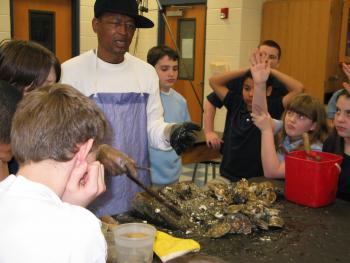Phillip Cisrow

New Jersey’s Delaware Bayshore
The Bayshore Center at Bivalve’s Oral History program is dedicated to preserving the oral history and culture of New Jersey’s Bayshore region by saving for posterity the oral histories and material culture connected with the Bayshore region, by creating a repository of recordings and data that can be used for research, by preserving, treasuring and celebrating the environment, history and culture of the Bayshore region and by sharing the heritage of the Bayshore region today and with future generations through program related activities serving visitors, students and scholars.
National Capital Contracting
Phillip Cisrow is a seasoned oyster shucker from the Whittington-Cisrow family, recognized for his expertise and achievements as a state champion in New Jersey. His proficiency in oyster shucking is not merely a professional endeavor but also a family tradition, indicating a deep-rooted connection to the industry. Cisrow's skills extend beyond his primary occupation, as he is also known for his interest in playing pool. His involvement in the oyster industry and his participation in related competitions highlight his dedication and passion for his craft. As a champion oyster shucker, Cisrow has honed traditional techniques that are not only effective but also emphasize safety, a critical aspect of the shucking process. His reputation and skill set have positioned him as a respected figure in his field, capable of educating and inspiring others through demonstrations and storytelling. Cisrow's personal history and family ties to the oyster industry provide a rich narrative that underscores the cultural and familial significance of oyster shucking within his community.
Scope and Content Note
Philip Cisrow demonstrates how to shuck an oyster and discusses the job of a shucker during a presentation to a 6th grade class at Port Norris School. He provides a comprehensive look into the traditional practices of oyster shucking and grading, as well as personal anecdotes from Cisrow's family history in the oyster industry. During a live demonstration in front of an audience, Cisrow showcases his shucking techniques, emphasizing the importance of safety and precision. He also encourages audience engagement by promoting an upcoming oyster shucking contest, fostering a sense of community and participation. The interview captures a chaotic conversation that touches upon various topics, including recreational activities like shooting pool, personal celebrations such as birthdays, familial connections, and competitive events. Despite the background noise and interruptions, the dialogue provides insight into the social dynamics and interests of the group, reflecting the informal and spontaneous nature of the discussion. The content of the interview is rich with details about Cisrow's professional experiences as a champion oyster shucker, his personal hobbies, and his contributions to the oyster industry. This oral history serves as a valuable resource for understanding the cultural significance of oyster shucking, the expertise required to excel in the field, and the personal stories that shape the identities of industry professionals like Phillip Cisrow.
Please Note: The oral histories in this collection are protected by copyright and have been created for educational, research and personal use as described by the Fair Use Doctrine in the U.S. Copyright law. Please reach out Voices@noaa.gov to let us know how these interviews are being used in your research, project, exhibit, etc. The Voices staff can help provide other useful resources related to your inquiry.
The NOAA mission is to understand and predict changes in climate, weather, oceans, and coasts, to share that knowledge and information with others, and to conserve and manage coastal and marine ecosystems and resources. The Voices Oral History Archives offers public access to a wide range of accounts, including historical materials that are products of their particular times, and may contain offensive language or negative stereotypes.
Voices Oral History Archives does not verify the accuracy of materials submitted to us. The opinions expressed in the interviews are those of the interviewee only. The interviews here have been made available to the public only after the interviewer has confirmed that they have obtained consent.
